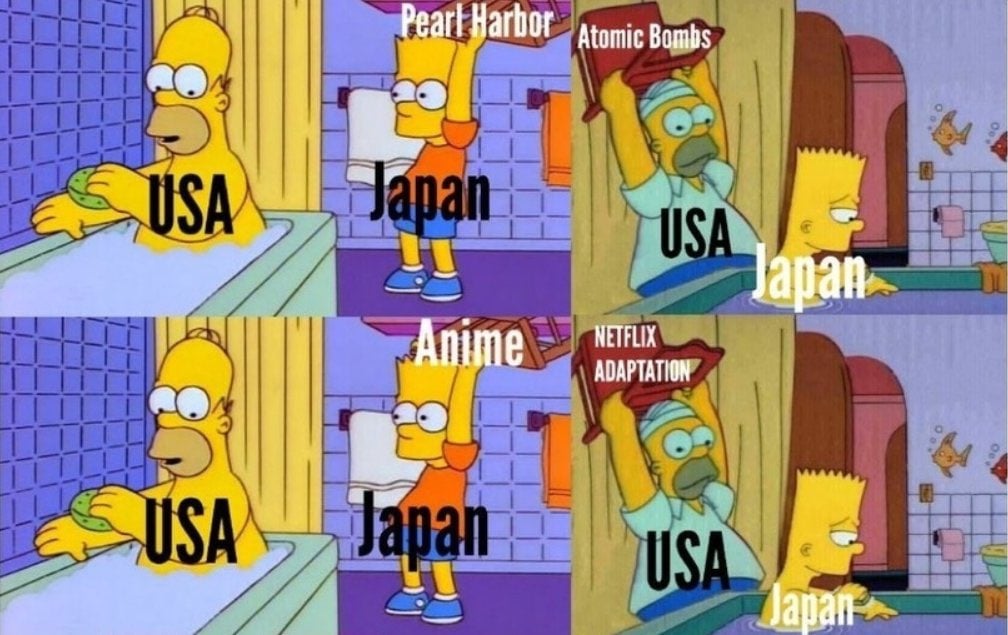this post was submitted on 21 Feb 2024
440 points (96.4% liked)
Memes
8506 readers
1125 users here now
Post memes here.
A meme is an idea, behavior, or style that spreads by means of imitation from person to person within a culture and often carries symbolic meaning representing a particular phenomenon or theme.
An Internet meme or meme, is a cultural item that is spread via the Internet, often through social media platforms. The name is by the concept of memes proposed by Richard Dawkins in 1972. Internet memes can take various forms, such as images, videos, GIFs, and various other viral sensations.
- Wait at least 2 months before reposting
- No explicitly political content (about political figures, political events, elections and so on), [email protected] can be better place for that
- Use NSFW marking accordingly
Laittakaa meemejä tänne.
- Odota ainakin 2 kuukautta ennen meemin postaamista uudelleen
- Ei selkeän poliittista sisältöä (poliitikoista, poliittisista tapahtumista, vaaleista jne) parempi paikka esim. [email protected]
- Merkitse K18-sisältö tarpeen mukaan
founded 2 years ago
MODERATORS
you are viewing a single comment's thread
view the rest of the comments
view the rest of the comments


I don't want to be rude but the sentiments expressed here present a double standard that excuses Japanese war crimes.
Point by point:
"Japan bombed Pearl Harbor in retaliation for US’s oil embargo." This is a somewhat correct statement but omits context vital to the decision making. The Imperial Japanese armed forces had formulated 2 plans for imperial expansion, one into the south and one into the north. The "retaliation for oil embargo" argument is a fabrication of the Japanese military class, a justification for the shifting of focus to the south in search of rubber, tin and of course oil. British and American forces dominated the south pacific and knowing that there would be an inevitable attack based on their expansion the Japanese executed a timed attack on numerous military strong points notably pearl harbour but perhaps more strategically relevant the Philippines. The "retaliation to embargo" argument is straight from the mouths of Japanese military propagandists, the USA in particular had bent over backwards to supply Japan in an effort to slake their expanding resource demands till this point.
"Fascism... imported from Germany": I'm not entirely sure why this was added as it is quite apparent to anyone studying Japanese military and political history of the late 19th and early 20th centuries that the Japanese empire had minted its own unique brand of extremist imperialism, you can term it fascism with the modern definition of the word but to insist that Japanese militarism in government is a result of European fascism is utterly ridiculous. In any case the foundations of this system date back to Meji era policies that significantly predate fascism in Europe as a practiced ideology.
"Attack on military assests", "Hiroshima and Nagasaki were war crimes"
While both these statements can be considered to be true it implies that there is some kind of defecit in morality between these two cherry picked events. I needn't go into detail on the extent of Japanese war crimes mere days after and indeed on the same day if you would consider actions in mainland Asia. You've created a fallacy of what-aboutism that doesn't fit the realities of the war and the extreme inhumanity of Japanese expansionism both before and after their attacks on the US. The atomic bombs while singularly destructive did not meaningfully exceed the levels of destruction wrought through conventional warfare. There is much to be said about if the bombs were in a sense "cost effective" in terms of loss of life needed to achieve peace but once the military losses are accounted for, various plans to fight till extermination, the political climate, etc. It becomes apparent that the bombs precipitated a political coup that would not have been possible otherwise. All things considered the bombs seem to have bought peace rather cheaply.
"crush any remaining resistance from Japan"
Other comments seem to cover this rather well but what alternative is there? When considering the potential loss of life of an invasion not just in enemy personnel or even civilians but your own soldiery it seems to be an easy choice. Arguments can be made about the scale, morality and civil cost of the bombs but it comes down to a philosophical argument on the ethics of the matter. Can such a scale of destruction ever be justified? Absolutely not. Given all the evidence available were the atomic bombs the least costly scenario in terms of the least amount of destruction in every conceivable metric? Absolutely yes. Any other assessment amounts to historical revision.
I can't reply fully tonight (inebriated) but this is a fantastic rebuttal. I didn't mean to excuse Japanese War crimes, just add some context to the meme.
I love you. Big fan of the Pacific War and have a large collection of books I've yet to read on the subject, but I've read the Ian Toll trilogy on the subject as well as listened to a great deal of Dan Carlin's Supernova in the East series on it, it's so fascinating how tangled the political web was there.
Your assessment builds on the (unprovable and undisprovable) assumption that an invasion would have otherwise happened. But we can't know what would have happened if different decisions were made. l Wikipedia says that at the time the top brass was split on this decision, and not just for moral reasons.
Also I'd like to mention that whether something is a war crime or not, is, at the end of the day, just a legal question. Back then it wasn't, but by today's treaties killing any civillian under any circumstance is indeed a war crime.